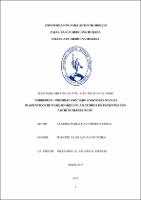Sobrepeso-obesidad asociado a mayores niveles plasmáticos de marcadores inflamatorios en pacientes con artritis reumatoide

Ver/
Descargar
(application/pdf: 413.8Kb)
(application/pdf: 413.8Kb)
Fecha
2019Autor(es)
Maldonado Correa, Claudia Paola
Metadatos
Mostrar el registro completo del ítemResumen
Objetivo: Identificar si los pacientes con sobrepeso - obesidad cursan con mayores niveles
de marcadores inflamatorios (PCR y VSG) en comparación de aquellos con normopeso, en
pacientes con artritis reumatoide.
Material y métodos: Se llevó a cabo un estudio transversal analítico que evaluó a 278
pacientes con artritis reumatoide, atendidos en el hospital Víctor Lazarte Echegaray; la
recolección de datos se realizó durante el periodo comprendido entre octubre del 2017 y
agosto del 2018. La muestra se obtuvo de manera no probabilística y por conveniencia, y
fue dividida en dos grupos según su IMC: sobrepeso-obesidad y normopeso; y se procedió
posteriormente a la comparación de la variable dependiente y de las intervinientes en
relación a dichos grupos.
Resultados: Los niveles plasmáticos de marcadores inflamatorios tuvieron un valor de PCR
promedio de 13.74 mg/dl y 10.12 mg/dl en los pacientes con sobrepeso-obesidad y
normopeso, respectivamente (p=0.015); en relación al VSG, la media fue de 39.26 mm/hr
en los pacientes con sobrepeso-obesidad y de 28.16 mm/hr en aquellos con normopeso
(p=0.000). La dislipidemia se presentó en un 58.1% y 37.8% de los pacientes con
sobrepeso-obesidad y normopeso, respectivamente. (p=0.001) Respecto a la capacidad
funcional, un 46.1% de los pacientes con sobrepeso-obesidad no presentó discapacidad al
igual que un 36% de los pacientes con normopeso. (p=0.001)
Conclusiones: Los niveles plasmáticos de marcadores inflamatorios, PCR y VSG, fueron
mayores en los pacientes con artritis reumatoide y sobrepeso-obesidad, en comparación de
los con normopeso. Además, la dislipidemia fue más frecuente en el grupo de sobrepesoobesidad
y la mayor parte de pacientes no tuvo discapacidad según el
cuestionario HAQ. Objective: Identify if patients with overweight-obesity, have higher plamatic level of
inflammatory markers in comparison with normal weight patients, in patients with
rheumatoid arthritis
Material and methods: An analytical cross-sectional study was carried out in 278 patients
with rheumatoid arthritis, treated at the Víctor Lazarte Echegaray hospital; data collection
was executed during the period between October 2017 and August 2018. The sample was
obtained in a non-probabilistic way and for convenience, and was divided into two groups
according to their BMI: overweight-obesity and normal weight; and then proceeded with
the analysis of the dependent variable and the intervening ones.
Results: Plasma levels of inflammatory markers had an average CRP value of 13.74 mg /
dl and 10.12 mg / dl in patients with overweight-obesity and normal weight, respectively (p
= 0.015); about ESR, the mean was 39.26 mm / hr in patients with overweight-obesity and
28.16 mm / hr in those with normal weight (p = 0.000). Dyslipidemia occurred in 58.1%
and 37.8% of patients with overweight-obesity and normal weight, respectively. (p =
0.001) Regarding functional capacity, 46.1% of the patients with overweight-obesity did
not present impairment, while the 36% of the patients with normal weight neither did. (p =
0.001)
Conclusions: Plasma levels of inflammatory markers, CRP and ESR, were higher in
patients with rheumatoid arthritis and overweight-obesity, compared with normal weight.
In addition, dyslipidemia was more frequent in the overweight-obese group, and most
patients had no disability according to the HAQ questionnaire
Palabras clave
Colecciones
- Medicina Humana [2984]

